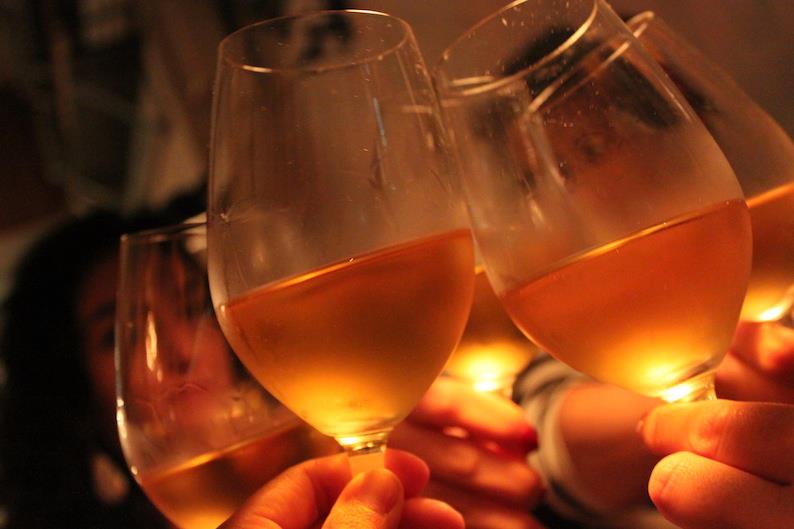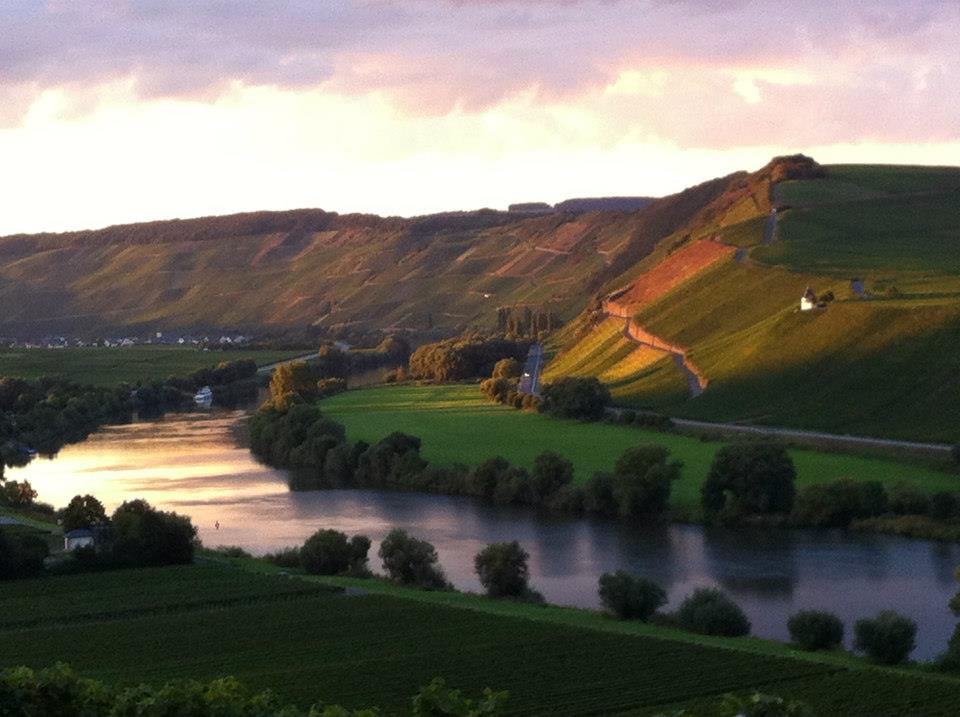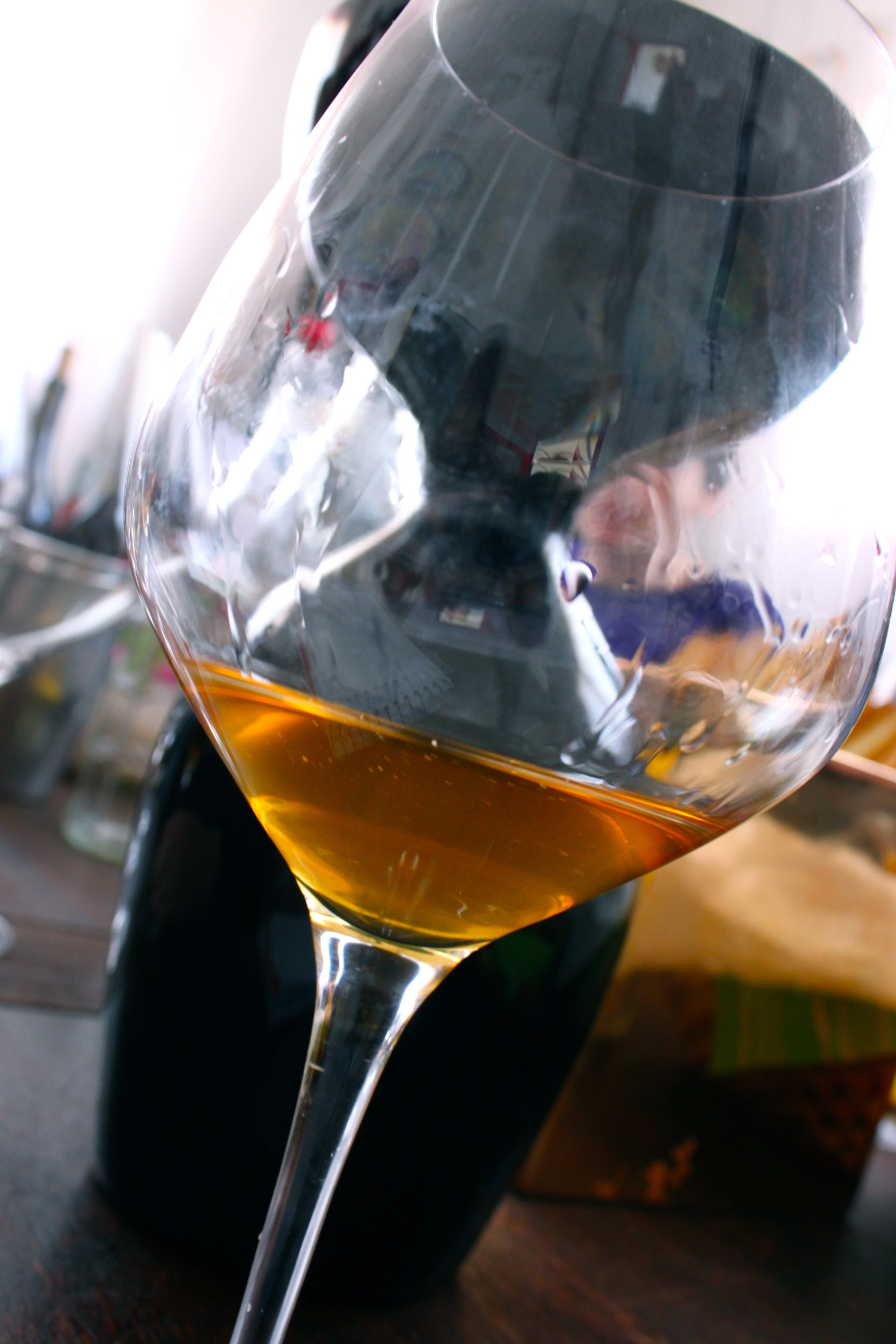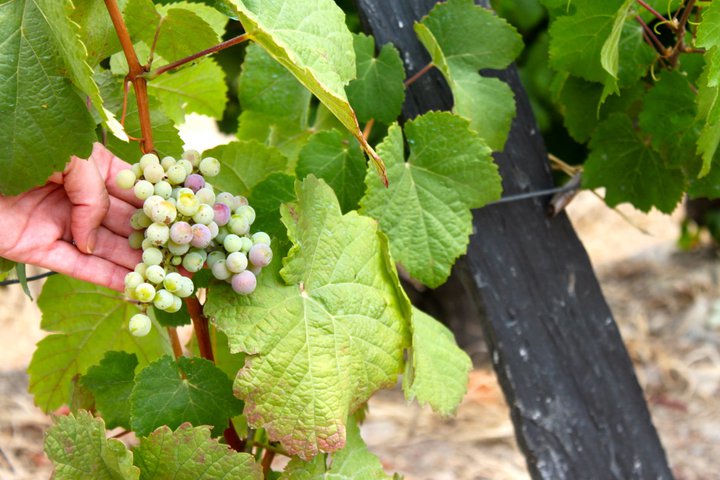
Rather than spending their lives defending nomenclature, delving into semantic nuances and untangling gossamer philosophical niceties, natural wine drinkers – copains & copines alike – drink wine. Which seems the natural thing to do. Unlike their more judgmental confreres in the wine trade they tend not to couch their opinions in the now-devalued currency of marks, nor worry their heads about hierarchies and awards. The wines they enjoy certainly possess enough depth; it is just that pleasure expressed without punctilious analysis is so much more fulfilling.
The wine trade en masse prefers to deal in absolute certainties in a way that ordinary drinkers don’t. Labelling, appellations, charters, groups, consumer acceptance panels, awards competitions – wine is nothing if not endlessly codified. Do I require empirical evidence to sense that certain wines are more natural than others, or are all the better for being more naturally made? No, I am not pedantic in this respect; I trust my (imperfect) sense of smell and taste and my highly subjective likes and dislikes. Experiencing wine on a visceral level gives me the enjoyment and the information I need. Labelling and regulations are imposed by faceless bureaucrats; they may discourage (some) bad practice, but more often they serve to frustrate good practice.
Definitions can erode aesthetic appreciation by putting things into small boxes. The magic of a sunrise or a sunset or an amazing star-studded night sky conjures a rich response– their transcendence is not enhanced by a profound working knowledge of the mechanics of the universe. Knowing the precise chemical and microbiological chain of events that constitute the winemaking process may be instructive and fascinating but leads us to react to wine in what I call “a gloomy analytical fashion”. Wine experienced thus becomes for us a de facto chemical product; we judge it by degrees of fault, surely the dullest counsel of perfection.
Real wine leaves something to the imagination; although mediated through the artisan grower it captures or refracts something of nature, something of the wild and unknowable. That collision of visceral “natural” response and aesthetic transformation is what sets great wine apart from the denatured, mass-market products.

A digression concerning the nature of wine tasting and the romantic imagination
Many dozens of books have fully explored the mechanics of taste, its fixities and definites, and there are numerous systems to codify or judge these. Sometimes I wonder if this is not a case of “we murder to dissect”. I would like to propose an alternative romantic notion that wine is a liquid vessel of experience waiting to be tapped by the poet within us, by alluding to the primary imagination, that which Coleridge refers to in his Biographia Literaria as “the living power and prime agent of all human perception… a repetition in the finite mind of the eternal act of creation in the infinite I AM”. This may be linked to our primary unmediated experiential perception of wine, an imaginative commitment which is creative in that it is inspirational, receptive, and spontaneous. The secondary imagination according to Coleridge “dissolves, diffuses, dissipates, in order to recreate” and so we use it to make sense of our primary experiences and shape them into words, culminating in the act of creation or, in our extended metaphor, the moment when wine becomes word. Tasting (wine) can be a sensory conduit through which we explore our memories and emotions and, like the contemplation of art, has the capacity to transform us positively.
The current orthodoxies in wine tasting seem to date back to Locke’s model of the mind as tabula rasa – totally passive in itself, and acted upon only by the external stimuli of the senses. Reducing wine to its material components is like reducing a rainbow to its discrete prismatic colours – a pure function of the mechanism of the eye. But there is a relationship between man and nature to be teased out: a camera-obscura can reproduce the rainbow insofar that it imitates the action of the eye, and, similarly, one can measure the physical contents (acidity, alcohol, tannin, sugar) of wine with laboratory instruments. As what the camera does not do is to perceive, which the romantics would define as a sentient act, and therefore an emotional experience, neither do the instruments in the laboratory taste the wine.
So far so obvious. The romantics would further say that the mind was an esemplastic, active, shaping organism with the capacity for growth. If we look at tasting merely as the science of accounting or describing phenomena, we diminish our own role in the process. Without the taster there would be no taste.
When the cultured snob emits an uncultured wow, when the straitjacketed scientist smiles, when scoring points becomes pointless, when quite athwart goes all decorum, when one desires to nurture every drop and explore every nuance of a great wine, surrendering oneself emotionally to the moment whilst at the same time actively transforming the kaleidoscopic sensory impressions into an evocative language that will later trigger warm memories, it is that the wine lavishes and ravishes the senses to an uncritical froth. Greatness in wine, like genius, is fugitive, unquantifiable, yet demands utter engagement. How often does wine elicit this reaction? Perhaps the question instead should be: How often are we in the mood to truly appreciate wine? Rarely, must be the answer, for if our senses are dulled or our mood is indifferent, we are unreceptive, and then all that remains is the ability to dissect.
To experience a wine fully you need to savour with your spirit as well as your palate, put aside preconceptions and “taste in the round”. As GK Chesterton wrote: “There is a road from the eye to the heart that does not go through the intellect”.

The Walrus and the Carpenter deconstruct a Chardonnay…
Ah yes, the obverse being the furrowing of the brows denoting concentration, the sepulchral hush, the lips curled in contumely, the business of being serious about wine – the calculated response based on a blend of native prejudice and scientific scepticism. But all wines are different and there is a story behind each one. Good humour, good company, good food and open-mindedness are the best recipe for imaginative appreciation. Leaving aside that dross is dross for a’ that, the mindset of the critic is often to anatomize for the sake of it. Too oaky, comments one sommelier about one particular Chardonnay that we were tasting. Too acidic, rejoins another. Too shoes and ships and sealing wax, says one. Too cabbages and kings, opines another. Criticism like this becomes an end in itself, a stylized response uncoupling pleasure from the experience, as if registering subjective pleasure should be invalid.
In conventional, reductive wine criticism you will not find any words like magic, joy, passion, spontaneity or creativity – the language of transcendence, where structures dissolve and new meaning is found through emotion and reaction. The more I taste wine, the more I believe that that each response is one of many truths and that if I purely use a narrow critical approach then I exclude my imagination and intuition. If we can bring an open mind to tasting wine – as Coleridge wrote, “There is in genius an unconscious activity” – we may allow the wine itself to breathe and fulfil its living destiny.
Why Real Wine?
The “annunciation” of natural wine (who first trumpeted this expression and when is still unclear) soon spawned a counter-culture of criticism from those who confounded an adjective with a tub-thumping philosophy. Their contention being that since every term, by definition, must have a polar opposite, then the affirmation that a wine might be natural was simultaneously the disparagement of all other wine which had been summarily deemed “unnatural”. Since it follows that unnatural reeks of pejorative connotations, those who would claim the natural banner would also surely claim the moral high ground, something which the opinion-formers, buyers, and conventionally-inclined winemakers, find naturally rebarbative.
Nothing could be further from the truth – the expression “natural wine” fully takes into account that there is a spectrum of possible interventions and choices in the vineyard and winery, but simply posits a “more natural” approach in human engagement in both arenas of winemaking. This can mean either a more interventionist programme (biodynamics is nothing if not proactive, for example) and/or a less interventionist one in the use of chemicals and additives. Natural is not a synonym for a primitive or laissez-faire methodology though the naysayers would have you believe this to be the case. Zero may be the ideal for a very few intrepid souls, but is rarely the reality for most natural winemakers who empirically tend to cut their interventionist cloth according to the materials they have. The prerequisite is always the same – beautiful, healthy grapes are the foundation of natural winemaking and provide the material for originality. The greater the number of manipulations and additions the less natural the wine becomes.
Wine (and food), after all, is shaped by the myriad of processes involved – chicken (Mc)nuggets may have once have featured a nodding acquaintance with chicken (or maybe not) but the number of additives and preservatives and modifications have transformed the original bird into a food product with a highly specific flavour and texture profile. If you add colouring, acids, flavours, enzymes and tannins to grape juice you will end up with a “wine product” – origin unknown. These products, self-evidently, are chemical constructs rather than natural products, a million miles away from the artisan wines we are talking about. And yet they are both classified as wine. So why not differentiate?
Real Wine is a convivial term, a counterpart to natural. If natural is too morally loaded for those with fragile sensibilities, then the tongue-in-cheek connotations of “real wine” should mollify all but the most absolute of pedants. Of course it won’t, but it’s fun to pretend. We know what it means, sort of, but, of course, it has no legal currency whatsoever let alone a precise meaning. Real wine refers warmly and fuzzily to wine that is made by small, individual growers, wine that smells and tastes of the vintage and the terroir, that isn’t afraid to be different, that is made with physical commitment rather than chemical intervention. What is unreal wine, our pedantic wine trade jester might ask, to which the reply might be frivolously that “Real wine – in its most colloquial sense – is unreal”. The reality is that the commercial diktat of the market makes most winemakers’ choices for them. These so-called real wines are not made for such a marketplace; thus it might be said that real identity and real individualism exist outside the highly circumscribed world of commercial determinism. That’s called realpolitik.
But I also understand that there is a desire in all these cases for practical definitions so that lines in the sand can be drawn. Otherwise where would those who have bones to pick, pick their bones? Would it help grower, consumer and critic, for example, if there were a certification process for natural wine, one underpinned by a specific charter? You might then be able to group growers under one banner; on the other hand, doing so militates against the spirit of what many of the growers are about, which is their very desire to be free of regulations. The appellation system was intended to support good practice and promote origin; instead it has become so debased that independent growers (who see themselves as defenders of good practice) are inclined to opt out.
Some believe that the so-called natural wine movement should front up with precise rules. But since the growers don’t seek certification and don’t care if their wines are marketed as natural then it becomes an irrelevance. It is all very well to say information, information, information but when the labelling becomes more important than what is inside the bottle, then you have created a system that thrives on nailing butterflies to wheels. If you get unpasteurised milk from your local farm you don’t doubt the authenticity of the milk – you’ve seen the cow, why would you need the certificate? Is it that a specific word “natural” has been appended to something which is freewheeling and aspecific that this semantic kerfuffle rumbles on? If so, how sad that the debate scrapes along at this level without any desire to come to a rational consensus.
A body should be able to come to a wine tasting and say: Yeah, those wines are pretty natural, pretty real or pretty raw. Not that they have to be pretty though! I understand the point of difference; I understand why these growers are standing shoulder to shoulder and I understand why one might use these words to describe those wines. It is not because they are all the same; by no means, it is rather because they are different and the broadness of such terms as real and natural reflects this heterogeneity.

Across the spectrum artisan growers are doing it for themselves; and they are increasingly subscribing to the natural approach. Natural wine, which started in bars and amongst friends, has remained close to its roots. As a result it has real traction. Meanwhile, in the real world, more and more growers are turning away from the highly interventionist path and making delicious wines which are appreciated by more and more people. That’s democracy, folks. Really. It involves incremental change by viral insinuation (as it were). It happens under our noses and in our glasses. To paraphrase Goethe’s Faust it is not about words, it is about actions.
What of the middle ground and its fuzzier edges? The smaller growers and estates who farm organically, or at least sustainably, who harvest the grapes by hand, who ferment with indigenous yeasts? Are they invited to the party? Is the term “natural” proscriptive or prescriptive? Is natural a matter of taste where the wines inhabit a section of the spectrum somewhere between wild and unforced? Or is it as nebulous as a feeling, a reflection of what I enjoy, which might be, on the one hand – and according to fancy – simple unadorned fermented grape juice, or something rather more complex and terroir-driven? Or is it that certain wines seem to have more vitality, more energy, more verve than others? A quality that can’t be circumscribed or enshrined in quotidian wine scripture. Perhaps this is what marks natural wines from other wines. That they relay their own imperfect truths more purely, for better or for worse.
None of these dancing angels matter in the grand scheme of things.
When you stand in a vineyard you understand how inconsequential human chatter is and how glorious birdsong is by comparison. When wine criticism becomes an art form in itself and wine a product qua product to interrogate ad nauseam, we have then set ourselves to arbitrate over something that we might barely have the merest passing acquaintance with. The artisan spends his or her life in a constant dialogue with nature: observing, sensing, getting his/her hands dirty and his/her brow sweaty. The artisan farmer forges an emotional bond with the place s/he works in. That has value, because of the very nature of the commitment. And whilst you can cross-examine the wine, coldly stripping it from its context, you lose everything that animates it.
To taste wine in the right spirit you need a little love, or at least some joy, in your heart.
Which is where we come in. I drink wine with family and friends. We sit and chat and enjoy wine, experiencing in the moment rather than analysing it to the nth degree. As long as the wine tastes natural and unforced, as long as it has energy or integrity or offers pleasure in spades, then it fulfils a special purpose. So many wines are not like this – they are squared off for a commercial reason, they are essentially lifeless because they originate from places where life has been extinguished by invasive farming, or have been oenologically denatured by exhaustive processing. These wines, consequently, can only offer as much as exists in their flavour profile remit. Conversely, living wines galvanise the spirit of enquiry, inspire a curiosity to investigate origins, to explore the singular sequence of events that made them come into being. At the very least, they liberate us from our selves and evoke a shiver of warm response.


